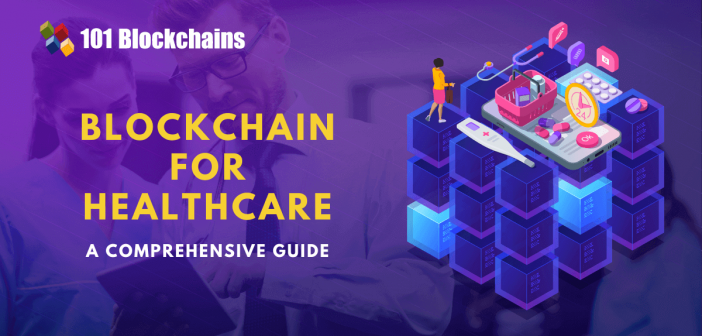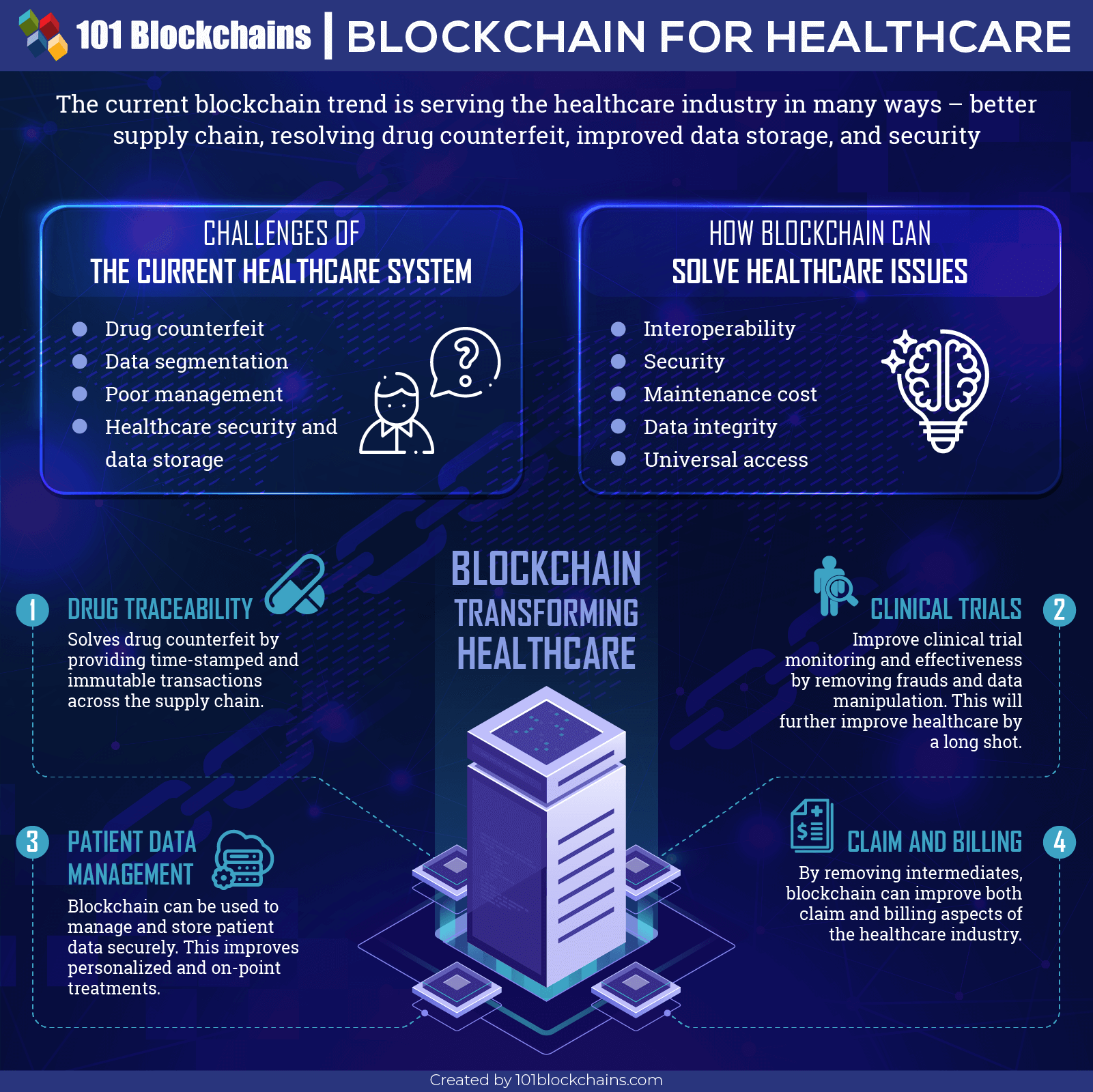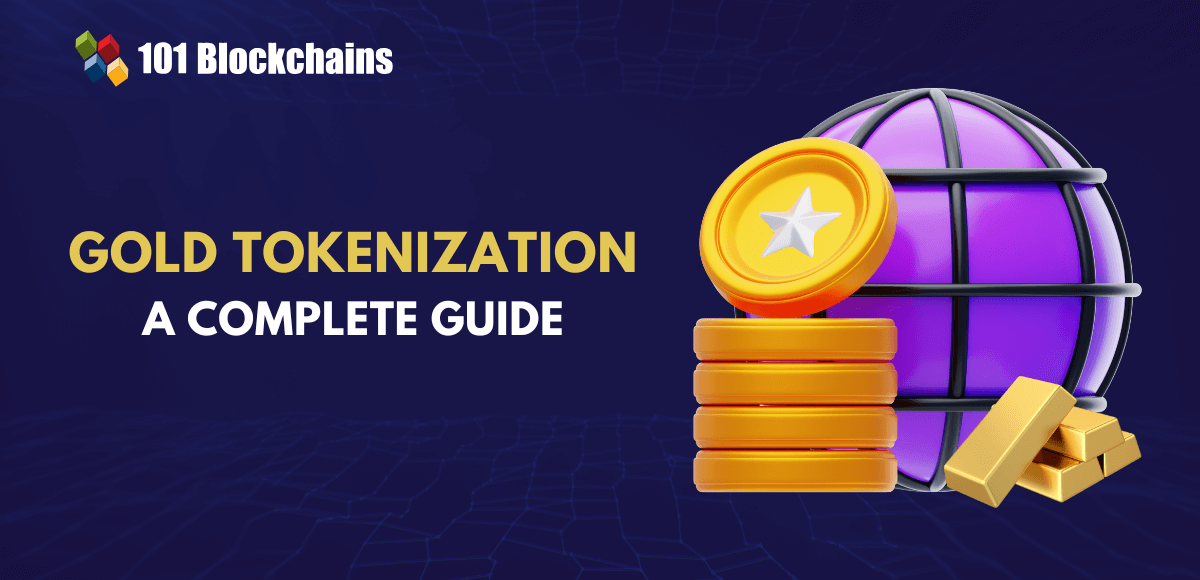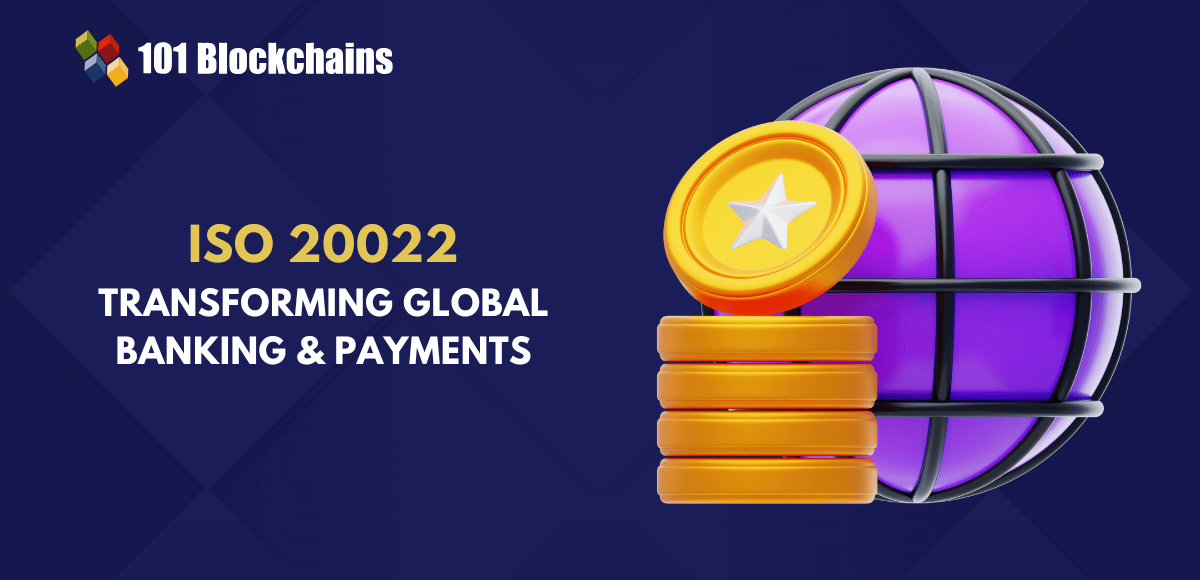Learn how blockchain truly works, master key definitions, and uncover what makes smart contracts so "smart." Dive into the fundamentals, gain valuable insights, and start your blockchain journey today!

- Guides
101 Blockchains
- on January 21, 2019
Blockchain For Healthcare: Use Cases And Applications
The demand for a revolution in technology or any sector is necessary. With technology improving at a rapid pace, it is no doubt that we are seeing new changes now and then. The healthcare industry also needs to make the most out of the changes and equip itself with the best possible services and the solution it can provide. The technology that we are speaking about that will revolutionize healthcare is blockchain. Blockchain can change how physicians access patients data, how clinical research will take place and other aspects of the healthcare ecosystem.
In this article, we will be going through the blockchain healthcare use cases and blockchain healthcare examples. These use cases will help us better understand the impact of blockchain on healthcare. The blockchain healthcare applications will come equipped with the latest technology can solve the challenges that the healthcare industry is going through. The focus should be on improving the quality of healthcare and ensuring that it takes a patient-centric approach rather than maximizing profit. There is no denying that the blockchain impact on healthcare will be substantial in the future. Here, we are trying to learn blockchain healthcare use cases by sharing blockchain healthcare examples and applications.
Build your identity as a certified blockchain expert with 101 Blockchains’ Blockchain Certifications designed to provide enhanced career prospects.
Blockchain For Healthcare Infographic
Please include attribution to 101blockchains.com with this graphic. <a href='https://101blockchains.com/blockchain-infographics/'> <img src='https://101blockchains.com/wp-content/uploads/2019/01/blockchain_for_healthcare.png' alt='Blockchain For Healthcare: Use Cases And Applications='0' /> </a>
Before, we dive deep into the blockchain healthcare uses cases and applications, we first need to understand the current healthcare system. Let’s get started.
Current Healthcare System
The current healthcare system is old. It relies heavily on the interaction between patient and physician and works on limited data. The limited aspect of the healthcare results in a mediocre healthcare system that keeps failing to take advantage of the data. Also, the current process of getting healthcare is long and tedious at its best. All of this results in non-effective handling of the patient.
Supply chain and Drug Counterfeit
The supply chain also suffers from the adverse effect of the supply chain. This dependency leads to manipulated prices, the late supply of drugs and much more. Drug counterfeiting is yet another big problem as it leads to massive loses for the whole healthcare industry. The current supply chain systems are not capable of keeping the counterfeit drugs at bay. This leads to a massive $200 million loss for the healthcare industry.
Want to know how blockchain impacts enterprise’s supply chain operations? Enroll Now: Enterprise Blockchains and Supply Chain Management Course
Data segmentation and no proper management
Healthcare data maintenance is another aspect where the current healthcare sector fails. Critical information and data about patients are scattered all over the systems and departments with no way to get the right information at the right time. This leads to issues and delays when a physician tries to learn about the patient. Even the patients are not in full control as they have too many reports from different physicians which are hard to manage in a single place. Due to the lack of critical data availability, many healthcare systems fail to provide the necessary treatment to the patients. The management system is also impacted as many players are disorganized and are not equipped with the right tools for a smooth process.
Healthcare data storage and security
Another problem that the healthcare system has to deal with is the misuse of healthcare data. The data is mostly sold to third party companies. There is more to the data misuse issue, which can be understood by going through the stats mentioned below.
- Not all clinical reports are reported in the US which means data loss
- The healthcare reports are filled with misleading information and errors
- Healthcare organizations in data breaches have lost $380 per record.
The reason for poor data handling is the use of outdated systems such as data silos that are not connected with most of the healthcare systems and applications. On top of that, some healthcare platforms like to have everything local which makes it even harder to find relevant information resulting in a time-consuming affair for doctors. The cost is also affected which hampers the patients. The current healthcare positions us for the blockchain healthcare use cases that we will discuss after we learn how blockchain can solve the current healthcare system.
Want to become a certified blockchain security expert? Enroll Now: Certified Blockchain Security Expert (CBSE)
How blockchain will solve healthcare issues
Blockchain can completely change the healthcare system. It can help the healthcare industry overcome the challenges that it is going through. For example, it can help improve universal access, integrity, security, traceability, and interoperability. Blockchain healthcare applications hold the key to improving the current healthcare condition.
With blockchain, multiple healthcare systems(HIS) can come together and exchange data with each other, thanks to the distributed framework that it has to offer. So, which challenges blockchain can solve? Let’s list them below.
Interoperability
One of the biggest advantages of using blockchain is the interoperability that it has to offer. The current HIS uses different types of protocols and standards to ensure that the data can be accessed across hospitals.
Most of the making use of CDA, FHI, HL7 2.X for data exchange and storage. However, this can lead to complexity when it comes to integrating new systems or platforms. The solution is blockchain. Blockchain can solve all the interoperability issues as it acts as a decentralized database. The data can be accessed thanks to the APIs with a focus on the standard data format. Blockchain can also work seamlessly with the current platforms and protocols that are used to access and store data.
Integrity
Blockchain’s integrity also solves a lot of problems that the current healthcare industry is going through. Blockchain in healthcare today realizes heavily on how the data is transmitted between systems. This leads to errors nullifying the importance of the data stored.
With blockchain, the data integrity can be maintained at all the levels all the time. It also enables remove multiple instances of obsolete patient data. Also, once the data is uploaded on the blockchain, it cannot be changed by malicious actors, preserving the integrity of the data. Only the patients can change the details when working with a physician. There are many case studies for blockchain in healthcare hints that blockchain can bring the necessary integrity to protect data from being stolen or misused.
Security
The current traditional healthcare industry suffers from data leaks that can cost them millions of dollars. With no proper solution, they are heavily reliant on trial and error, and that is too failing to secure all their platforms including data integrity. Data tampering and theft is becoming a big concern and should be properly dealt with. Blockchain utilizes data encryption using private keys, and only the receiver can decrypt the content using his key.
In short, we can easily say that blockchain offers better security than the currently available solutions out there.
Maintenance Cost
Maintenance cost is also an integral problem with the current healthcare systems. The current system requires maintenance across different operations and needs a specialized team to ensure that all the functions are running accordingly and are in sync. Blockchain doesn’t suffer from this problem as it is a distributed decentralized network.
Data is distributed across the network which means that there is no single point of failure. If a node goes down, data can be fetched from other nodes as there are multiple copies of the data on the network. Each node has its copy of the database. The backup mechanism is amazing as it will help hospitals to cope with the emergencies better. Another benefit of having a backup on each node means that there is less transaction cost when it comes to storing or retrieving information.
Universal Access
Blockchain provides universal access to all its users. It is not dependent on a central authority which makes universal access possible. Authorized entities can easily access data whenever needed, and the whole process can be automated with different mechanisms similar to smart contracts. In short, blockchain for medical is promising and should also be encouraged in the working environment.
Not sure how to build your career in enterprise blockchains? Enroll Now in How to Build Your Career in Enterprise Blockchains Course
Blockchain for Healthcare: Use Cases and applications
There are plenty of blockchain use cases of blockchain for healthcare. Let’s discuss them below.
1. Drug Traceability
-
Problem
The drug counterfeit problem is one of the major problems in the healthcare industry. With around 10 to 30% of the drugs counterfeit, it is high time for healthcare institutes to fix it for good. Not only they lose millions of dollars of revenue but also impacts the patients. Right now, the amount of counterfeit drug market is now worth $200 billion annually. The two main countries which are the largest producer of counterfeit medicine is China and India. That’s a huge issue, and it needs to be fixed using blockchain. Counterfeit medicine is generally more harmful as they either do not contain the necessary ingredients or consists of different ingredients.
-
Solution
Blockchain can solve all these issues by providing the security and drug traceability. Blockchain works by adding transactions to the block. These transactions are immutable and are also timestamped for later verification. So, if the whole supply chain is moved to the blockchain, all of the issues can be fixed. This is a perfect example of the blockchain use case in pharma.
The hospital information system can work with a private blockchain if they need. The most appropriate solution is to use a hybrid blockchain with some aspects of it being private and others to be public. This way they can not only keep their data safe but also communicate with other systems and share public information.
All drugs need to be registered on the blockchain before they began circulation. So, if a drug record is not found on the blockchain, it can easily be deemed fake and discarded from the supply chain. This simple method can be used to check the authenticity of the drugs.
Blockchain will also provide an end-to-end solution where platforms can work together. The systems will be able to track drugs and improve the whole process of how drugs are supplied to the retailers and patients.
Startups or solutions implementing the use cases include SAP Pharma Blockchain POC app, Novartis, GEM, Chronicled
Get familiar with the terms related to blockchain with Blockchain Basics Flashcards.
2. Clinical Trials
-
Problem
Clinical trial is a simple method of testing a new drug and its effectiveness in a controlled environment. It can easily take a few years to complete. Not only that the pharmaceutical companies need to invest heavily in clinical trials. They are adding all of these up, meaning a lot at stake for the companies. With so much as stake, there is no doubt that we see frauds in clinical trials. The companies will also not admit if they have done any fraud on their own. This means that there should be a transparent solution that lets anyone review the clinical reports and ensure that the results of the trial are not tampered with.
Clinical trials produce tons of data. It includes statistics, reports, surveys, medical imagery, blood tests and so on. The first challenge for the team working on the clinical trials is to ensure that they take care of the collected data in a proper manner. Generally, it becomes very hard to manage data which leads to mistakes which are not intended to be there in the first place.
Frauds happen in the form of data manipulation. Some data is kept hidden and never reaches the systems, whereas others are modified to reach the desired result. Organizations who are conducting the trials will never come forward and tell that they manipulated information. Other problems include not-sharing of critical information before a clinical trial starts. Things such as research protocol, hypothesis, data storage methods are not shared. The lack of information transfer during critical phases of the trial means that modifications can be done later in the tests to reach desired results. Also, forms are mostly non-compete and hence fabricated.
-
Solution
Blockchain can act as the medium to facilitate clinical trials. As blockchain provides data integrity, it can act as a proof when the authenticity of the documents needs to be verified. It also let’s add new data which requires other nodes for the verifications process. Overall, the distributed networks ensure that the data integrity is maintained and also make sure that no data can be modified without authorized access.
The simple idea of data integrity can change how clinical trials take place. It is a system with no loophole and can improve our healthcare for good. The term that best fits the blockchain is a system that offers “proof-of-existence” which means that the data can be verified. It also uses SHA256, top-notch cryptography algorithm to ensure that the data cannot be modified and hacked by any third-party malicious actors.
Startups or solutions implementing the use cases include Amgen, Pfizer, and Sanofi.
Start your blockchain journey Now with the Enterprise Blockchains Fundamentals
3. Patient Data Management
-
Problem
Our health is crippled with varied issues and health concerns. This means that each patient is different which makes patient data management hard. As each disease works differently for different patients, it is also not possible to create a structure or use a common treatment strategy. If treatment worked on one patient, it doesn’t mean that it will work on everyone with the same disease. All of these complex issues make it necessary to have complete medical records for the patient. This will enable personalized care with a focus on patient-centric treatment.
Another challenge that most of physician goes through is the lack of information availability. This can result in patient treatment adding more cost to overall healthcare.
The patient data is also not safe as it the systems on which the data is stored are not completely secure. Doctors also use insecure way to share information. For example, we can easily see doctors sharing information through social media. This can easily lead to the patient data leak. Moreover, the patients are never in charge of their data. Data ownership is also an issue where the organizations mainly posses the patient’s data without the proper permission of the patient.
-
Solution
Blockchain provides a good way to handle patient data management. It provides a structured way to store data which can be accessed by the right professionals. Patients data can be stored on the blockchain and can only be kept accessible to the patient the doctor who is handling the case. Access can be revoked anytime which ensure that the patient has full authority on his medical reports. That doesn’t mean that not all data is inaccessible. Insensitive data is available publicly which then can be accessed by healthcare organization or stakeholders through API. This ensures proper collaboration across different systems. Doctors can also request data whenever possible.
Patients can also share their data without revealing their identity. This is extremely favorable to the healthcare institutes as they can use the anonymous data to improve their healthcare research and systems. Patients always have control of their data, and they decide who can access the data.
When combined with IoT, researches can constantly monitor the patient condition such as heartbeat and other vital body functions. This will help improve patients health care are taken care of. IoT with the help of blockchain can enable faster decision making and saving patients life in critical life conditions.
Startups or solutions implementing the use cases include DokChain, Patientory, GEM, GuardTime
Claim and Billing
-
Problem
The last problem that we are going to discuss is the healthcare claims. Healthcare billing and claims are full of fraudulent activities with billing suffering the most. Hospitals are the front runner as they bill the patients with services that are either never taken or are overpriced than the industry standards. All of these are done to maximize profit, keeping the interest of the patients at bay. Not only that, hospitals and physicians are also caught many times on improper presenting the health condition of the user which makes things even worse.
The intermediaries within the systems that are designated to verify the claims are also reluctant in their job and leave the end users hanging. The claims take a lot of time to process, and one has to visit the office any time before it is processed.
-
Solution
Blockchain can sole both the billing and claim process. If the billing process is connected with blockchain, then there is no chance for the health provider to overcharge a patient for the services or add a service that the patient never took in the first place.
Claim management can also be improved. With blockchain, it can be reduced to a few minutes rather than months. This is because intermediaries will be removed and automation can take control of the whole claim process.
Currently, there is no significant startups or organizations working to solve the use case.
Start learning Blockchain with World’s first Blockchain Career Paths with quality resources tailored by industry experts Now!
Conclusion
Blockchain holds a lot of promise and is ready to deliver its results in the healthcare industry. In this article, we explored the different blockchain use cases and applications. We covered the problems and their solutions so that it is easy for you to understand how blockchain can solve the challenges that the current healthcare industry is going through. Blockchain in healthcare today is in its infant stage, and we can see improvements in the next few years.
*Disclaimer: The article should not be taken as, and is not intended to provide any investment advice. Claims made in this article do not constitute investment advice and should not be taken as such. 101 Blockchains shall not be responsible for any loss sustained by any person who relies on this article. Do your own research!






